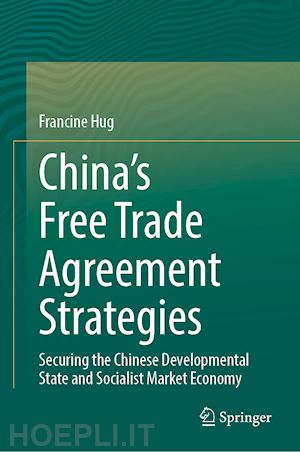

Questo prodotto usufruisce delle SPEDIZIONI GRATIS
selezionando l'opzione Corriere Veloce in fase di ordine.
Pagabile anche con Carta della cultura giovani e del merito, 18App Bonus Cultura e Carta del Docente
This book delves into the intriguing paradox of China's position in international trade law. Although China is an active member of the World Trade Organisation (WTO) engaging in substantial trade, tensions with trading partners may also arise. In this context, the book explores the legal principles informing Chinese Free Trade Agreements (FTA) and aims to answer the pivotal question: What drives China's FTA strategies?
With unique analytical methods and a novel theoretical framework, this book sheds light on China's FTA strategies, challenging prevailing notions about State intervention in the economy and offering a nuanced perspective on China’s position in the world trading system. By exploring how Chinese FTAs align with developmental State and socialist market economy principles, the book contributes significantly to the fields of international economic law generally, and Chinese law specifically.
Readers, especially those interested in international trade law and China's economic policies, will benefit from gaining a deeper understanding of the principles guiding China's FTA strategies and their contrast with leading liberal regimes like the WTO, the United States, and the European Union. This thought-provoking and pioneering book presents a fresh perspective on China's role in the global trade landscape. It is thus an essential resource for anyone curious about the interaction between China’s distinctive political economy and the transforming international economic order.
Introduction.- Selective Investment Liberalisation National Treatment Capital Export and Expropriation.- Rules Governing State Owned Enterprises Competition Coordination and Control.- Domestic E-Commerce Promotion Through State Managed Liberalisation.- Conclusion.
Dr. Francine Hug is a Postdoctoral Fellow at the Chinese University of Hong Kong working on investment, energy, and environmental law reforms pertaining to China’s coal phase-out along the Belt and Road Initiative, and the implementation of Just Energy Transition Partnerships.
Previously, she was a Visiting Scholar at the East-West Center (USA), where her research focused on Chinese deep-sea mining and submarine cable investments in the Pacific. To this purpose, she analysed the effectiveness of domestic and international laws at the cybersecurity, energy, environment, and Indigenous rights nexus.
Prior to academia, Dr. Hug served as Senior Economic Officer at the Embassy of Switzerland to China, Mongolia, and the Democratic People’s Republic of Korea. In this role, she participated in various treaty negotiations, including the China-Switzerland Free Trade Agreement, provided ministerial advice, wrote policy analyses, codesigned macroeconomic strategies, managed projects on e.g. fossil fuel subsidies reforms, clean energy, or WTO-law, and cooperated with international organisations, such as the United Nations Industrial Development Organisation, International Labour Organisation, International Institute for Sustainable Development, and World Economic Forum.
Dr. Hug further served in non-governmental organisations in Tanzania, Haiti, Peru, and South Africa on microfinance, sustainable development, capacity building, health policies, and conflict resolution. She gained additional experiences at the International Olympic Committee, Organisation for Security and Cooperation in Europe, British Council, Nokia Siemens Networks, a Singapore-based think-tank, and in journalism.
Dr. Hug holds a Ph.D. from the National University of Singapore, M.A. from the University of London (SOAS), and B.A. from Beijing Language and Culture University.











Il sito utilizza cookie ed altri strumenti di tracciamento che raccolgono informazioni dal dispositivo dell’utente. Oltre ai cookie tecnici ed analitici aggregati, strettamente necessari per il funzionamento di questo sito web, previo consenso dell’utente possono essere installati cookie di profilazione e marketing e cookie dei social media. Cliccando su “Accetto tutti i cookie” saranno attivate tutte le categorie di cookie. Per accettare solo deterninate categorie di cookie, cliccare invece su “Impostazioni cookie”. Chiudendo il banner o continuando a navigare saranno installati solo cookie tecnici. Per maggiori dettagli, consultare la Cookie Policy.